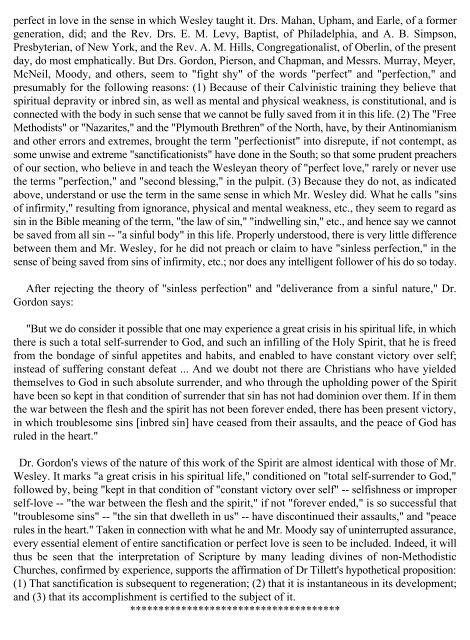Scriptural Sanctification - Media Sabda Org
Scriptural Sanctification - Media Sabda Org
Scriptural Sanctification - Media Sabda Org
Create successful ePaper yourself
Turn your PDF publications into a flip-book with our unique Google optimized e-Paper software.
perfect in love in the sense in which Wesley taught it. Drs. Mahan, Upham, and Earle, of a former<br />
generation, did; and the Rev. Drs. E. M. Levy, Baptist, of Philadelphia, and A. B. Simpson,<br />
Presbyterian, of New York, and the Rev. A. M. Hills, Congregationalist, of Oberlin, of the present<br />
day, do most emphatically. But Drs. Gordon, Pierson, and Chapman, and Messrs. Murray, Meyer,<br />
McNeil, Moody, and others, seem to "fight shy" of the words "perfect" and "perfection," and<br />
presumably for the following reasons: (1) Because of their Calvinistic training they believe that<br />
spiritual depravity or inbred sin, as well as mental and physical weakness, is constitutional, and is<br />
connected with the body in such sense that we cannot be fully saved from it in this life. (2) The "Free<br />
Methodists" or "Nazarites," and the "Plymouth Brethren" of the North, have, by their Antinomianism<br />
and other errors and extremes, brought the term "perfectionist" into disrepute, if not contempt, as<br />
some unwise and extreme "sanctificationists" have done in the South; so that some prudent preachers<br />
of our section, who believe in and teach the Wesleyan theory of "perfect love," rarely or never use<br />
the terms "perfection," and "second blessing," in the pulpit. (3) Because they do not, as indicated<br />
above, understand or use the term in the same sense in which Mr. Wesley did. What he calls "sins<br />
of infirmity," resulting from ignorance, physical and mental weakness, etc., they seem to regard as<br />
sin in the Bible meaning of the term, "the law of sin," "indwelling sin," etc., and hence say we cannot<br />
be saved from all sin -- "a sinful body" in this life. Properly understood, there is very little difference<br />
between them and Mr. Wesley, for he did not preach or claim to have "sinless perfection," in the<br />
sense of being saved from sins of infirmity, etc.; nor does any intelligent follower of his do so today.<br />
After rejecting the theory of "sinless perfection" and "deliverance from a sinful nature," Dr.<br />
Gordon says:<br />
"But we do consider it possible that one may experience a great crisis in his spiritual life, in which<br />
there is such a total self-surrender to God, and such an infilling of the Holy Spirit, that he is freed<br />
from the bondage of sinful appetites and habits, and enabled to have constant victory over self;<br />
instead of suffering constant defeat ... And we doubt not there are Christians who have yielded<br />
themselves to God in such absolute surrender, and who through the upholding power of the Spirit<br />
have been so kept in that condition of surrender that sin has not had dominion over them. If in them<br />
the war between the flesh and the spirit has not been forever ended, there has been present victory,<br />
in which troublesome sins [inbred sin] have ceased from their assaults, and the peace of God has<br />
ruled in the heart."<br />
Dr. Gordon's views of the nature of this work of the Spirit are almost identical with those of Mr.<br />
Wesley. It marks "a great crisis in his spiritual life," conditioned on "total self-surrender to God,"<br />
followed by, being "kept in that condition of "constant victory over self" -- selfishness or improper<br />
self-love -- "the war between the flesh and the spirit," if not "forever ended," is so successful that<br />
"troublesome sins" -- "the sin that dwelleth in us" -- have discontinued their assaults," and "peace<br />
rules in the heart." Taken in connection with what he and Mr. Moody say of uninterrupted assurance,<br />
every essential element of entire sanctification or perfect love is seen to be included. Indeed, it will<br />
thus be seen that the interpretation of Scripture by many leading divines of non-Methodistic<br />
Churches, confirmed by experience, supports the affirmation of Dr Tillett's hypothetical proposition:<br />
(1) That sanctification is subsequent to regeneration; (2) that it is instantaneous in its development;<br />
and (3) that its accomplishment is certified to the subject of it.<br />
*************************************
















